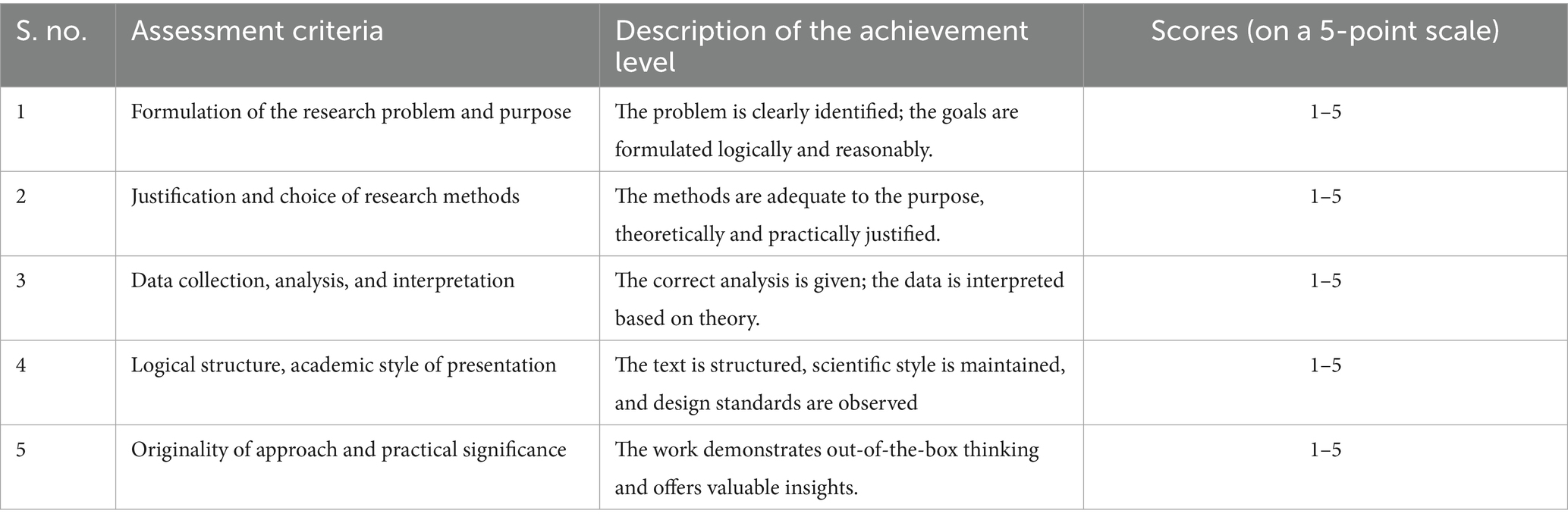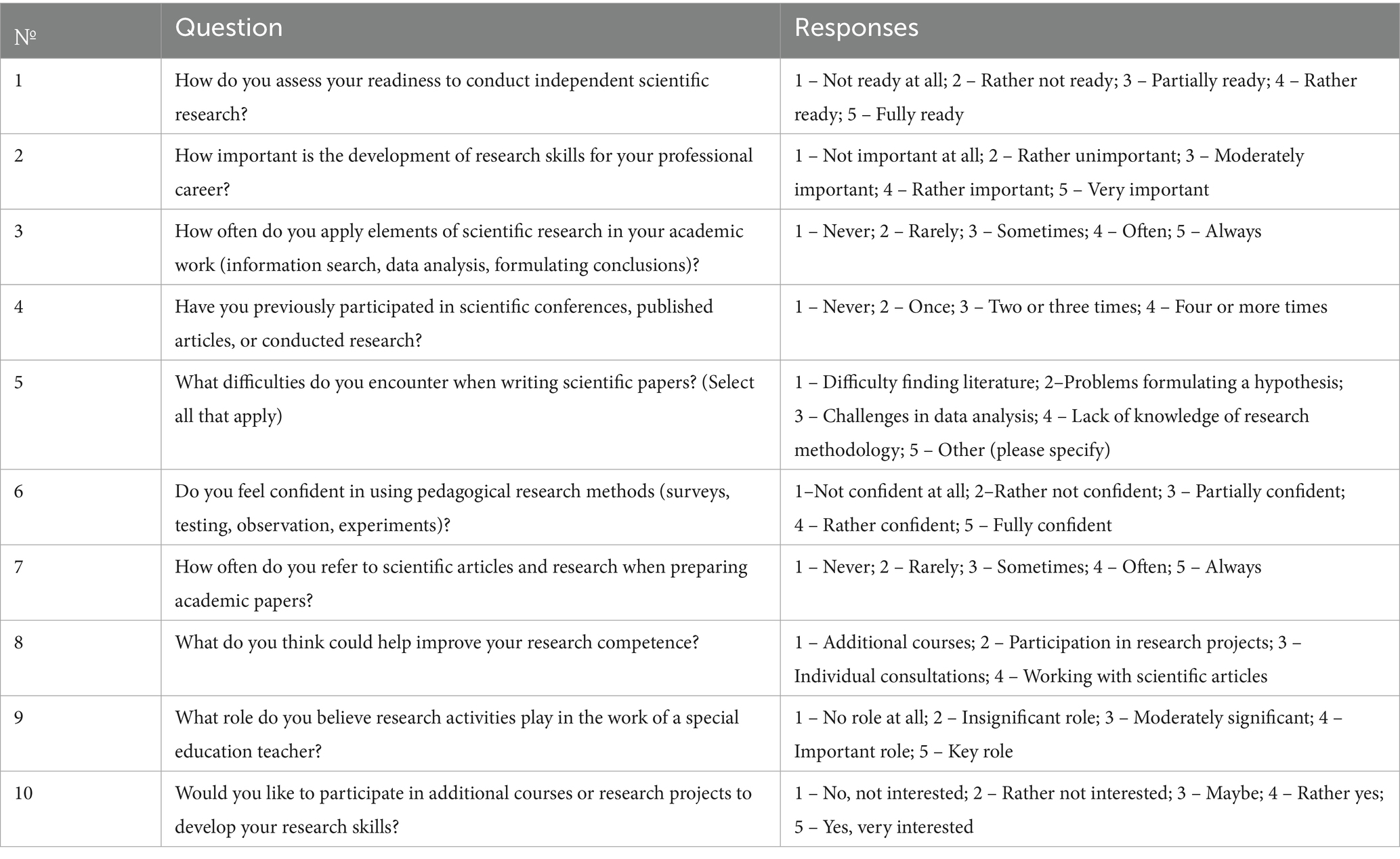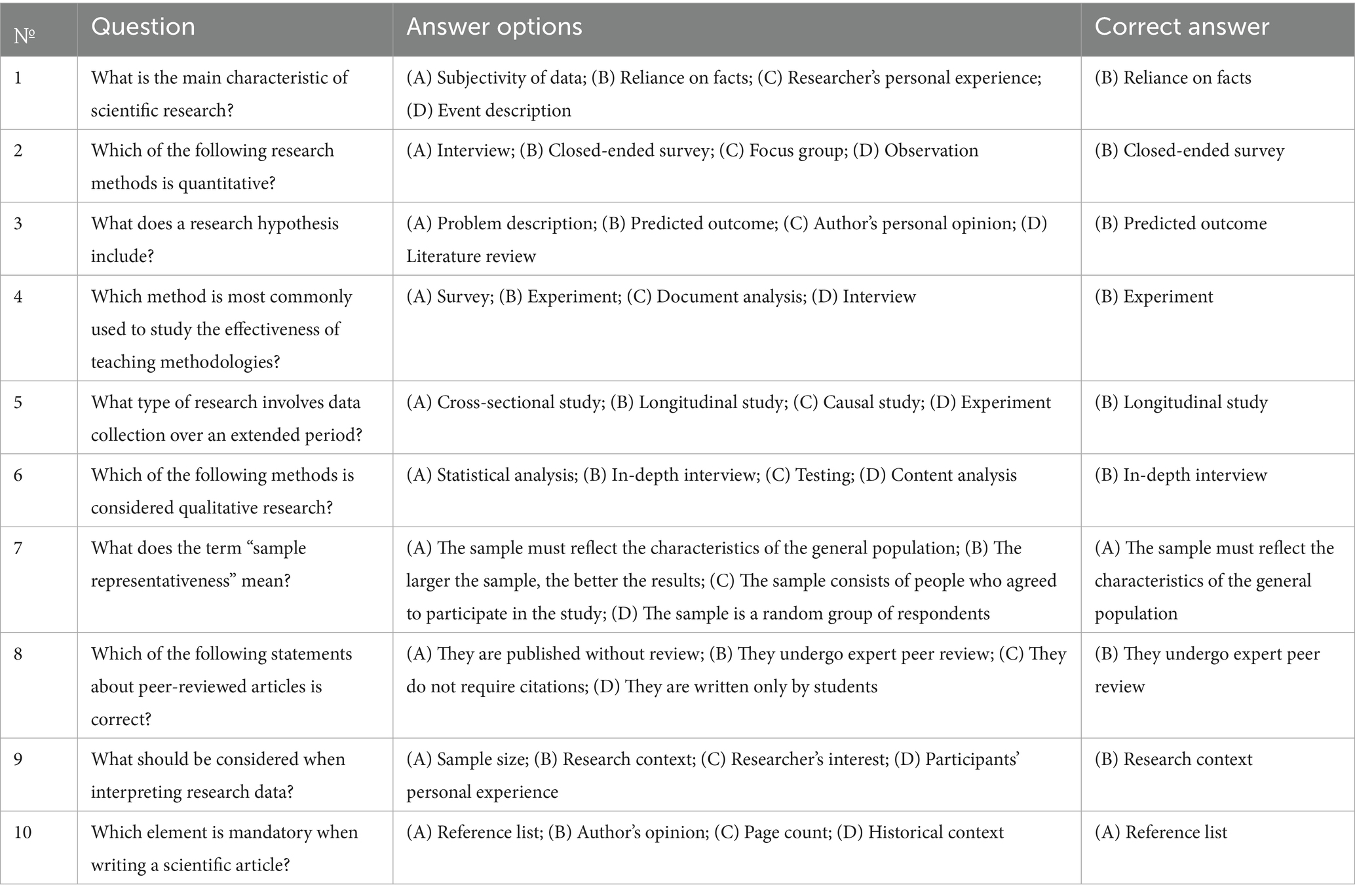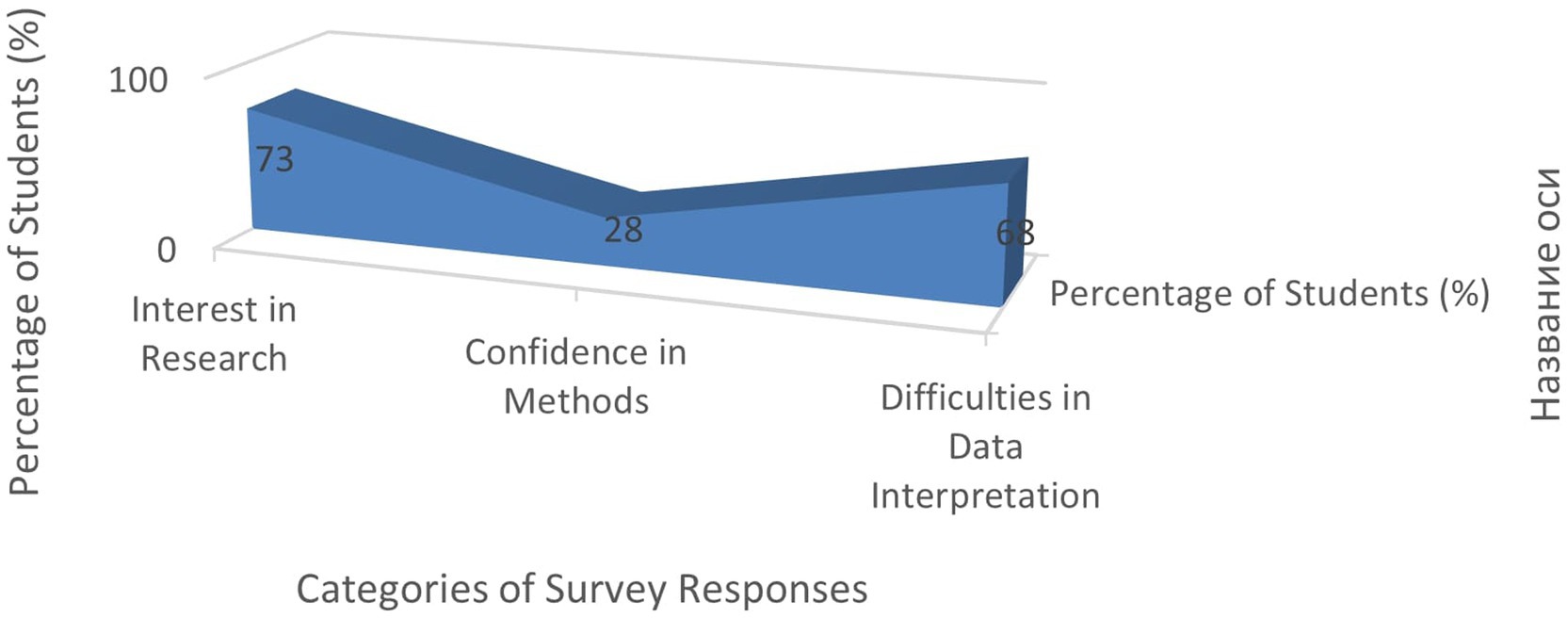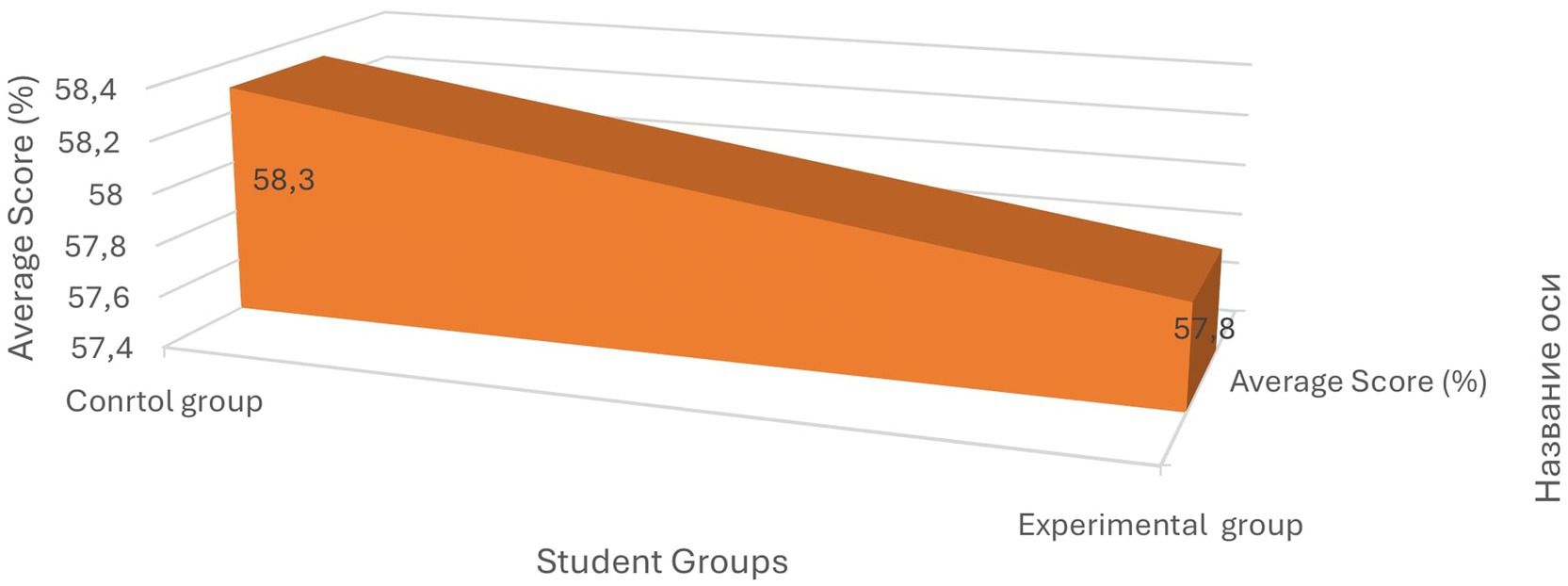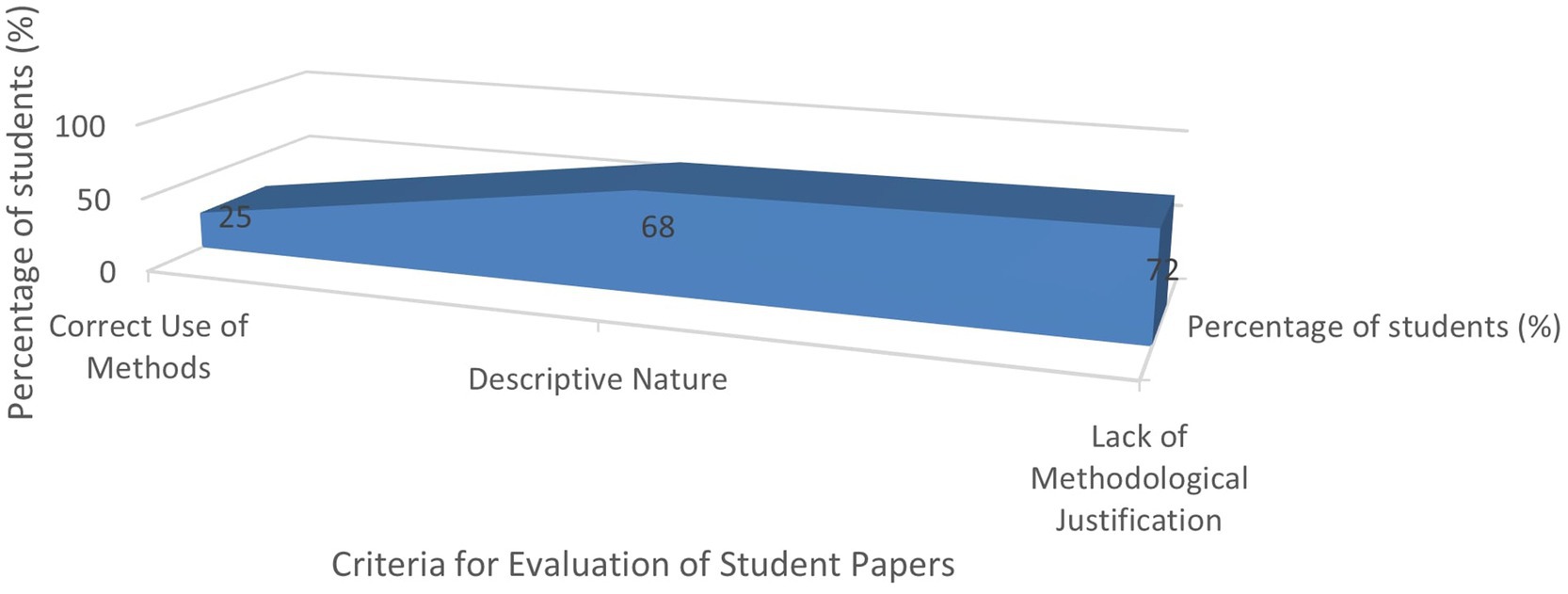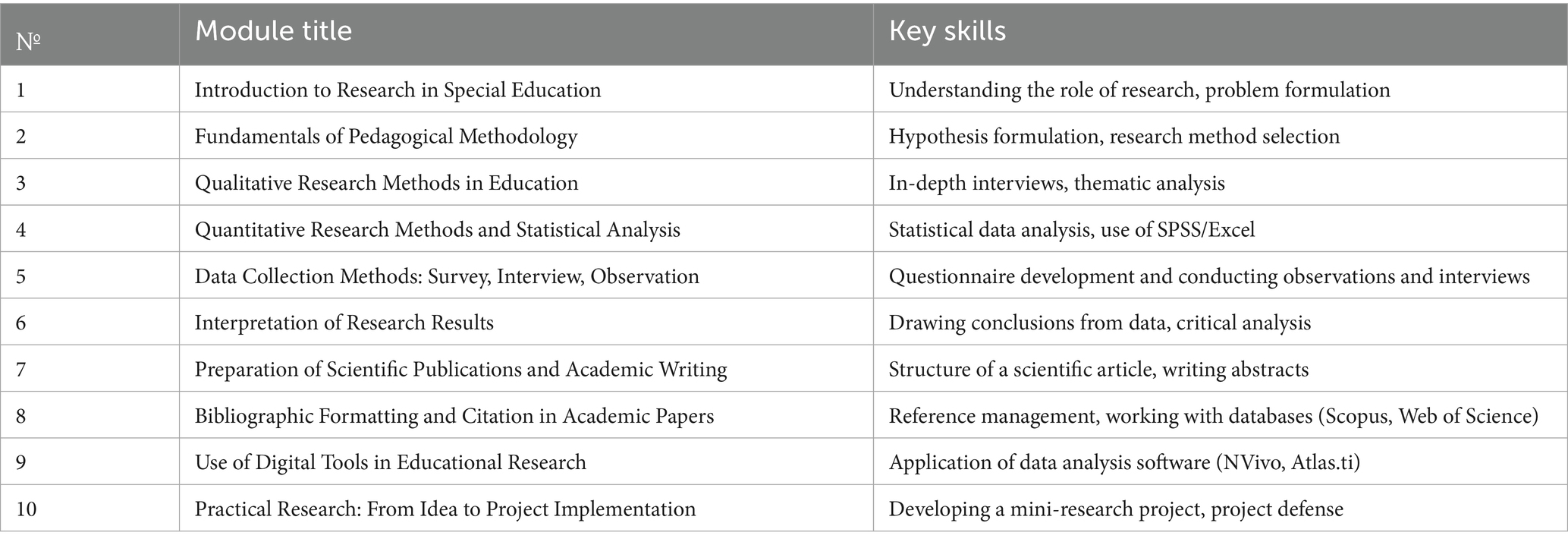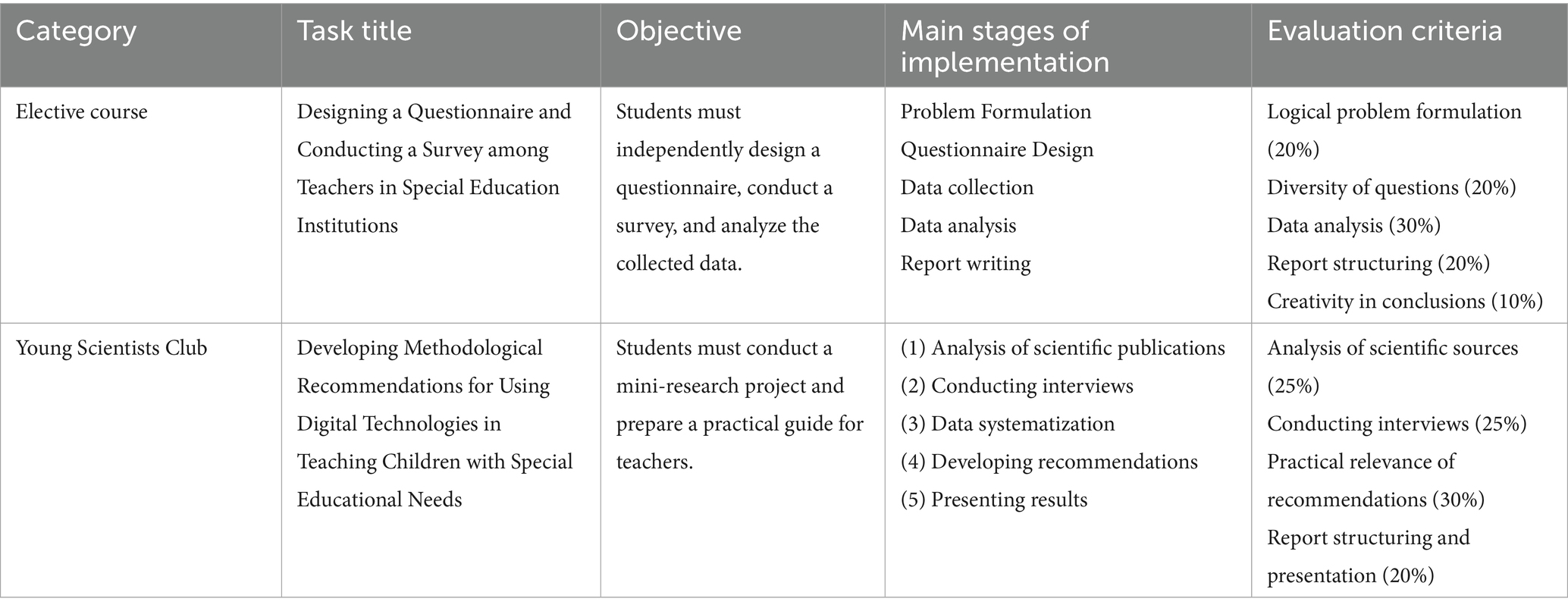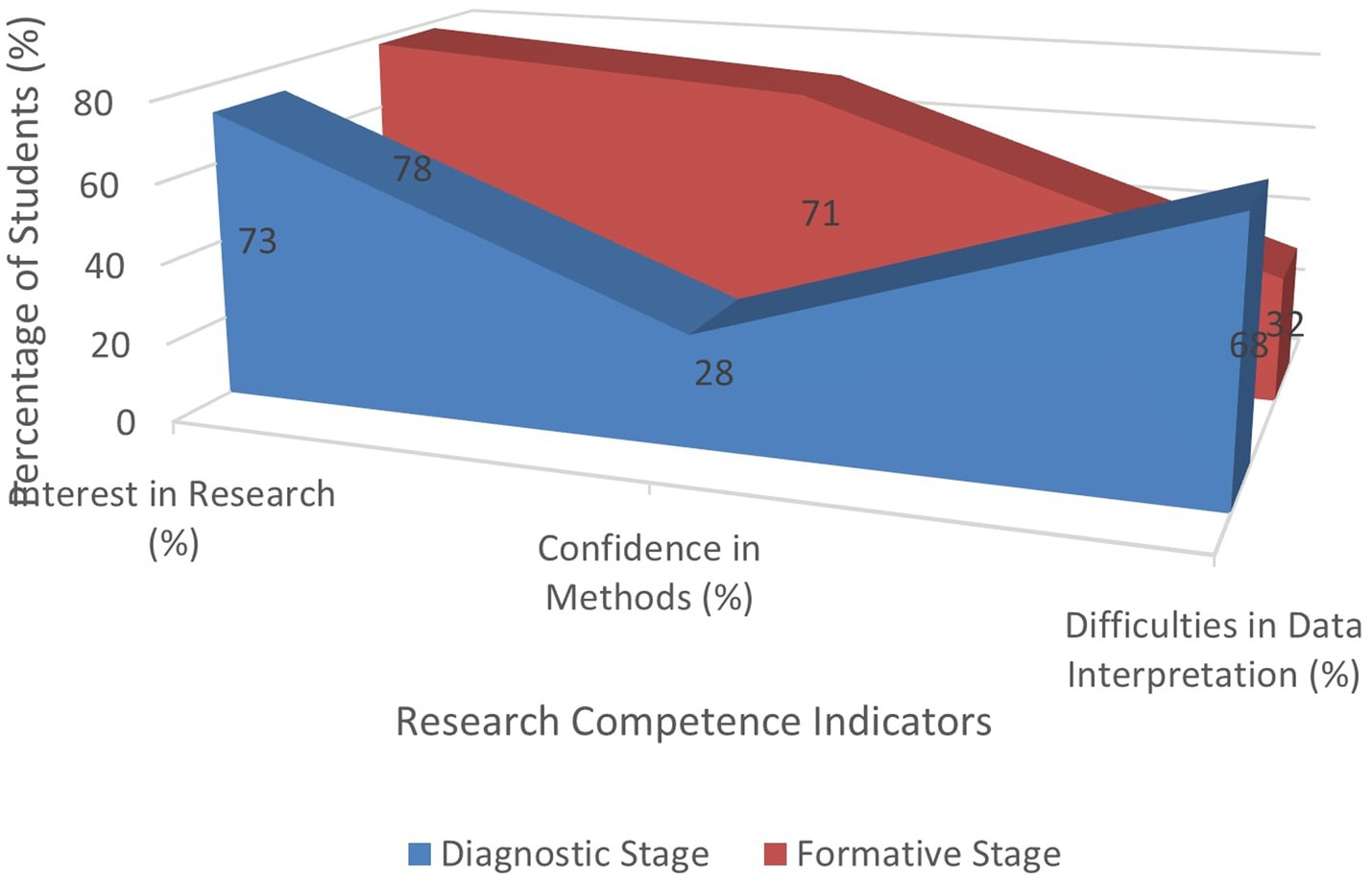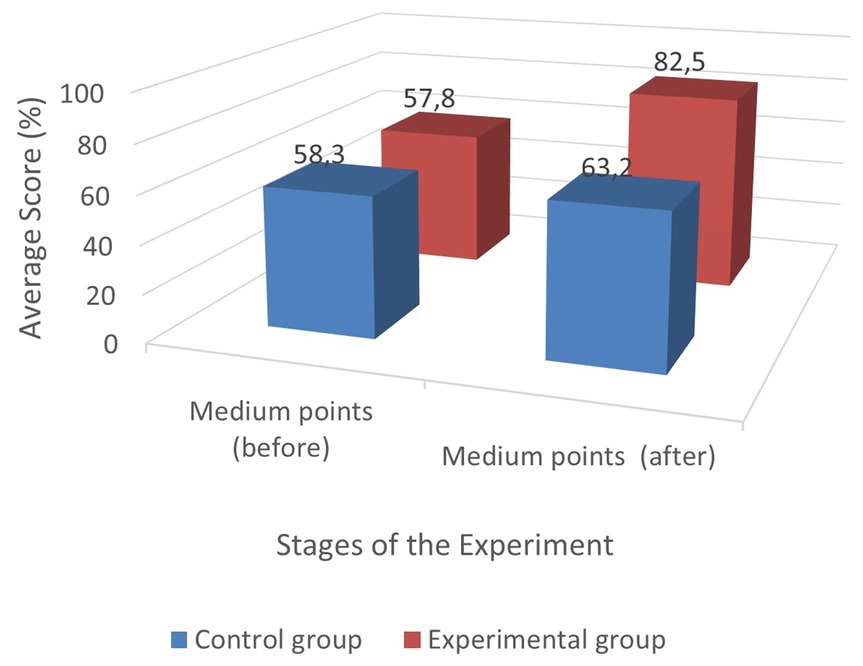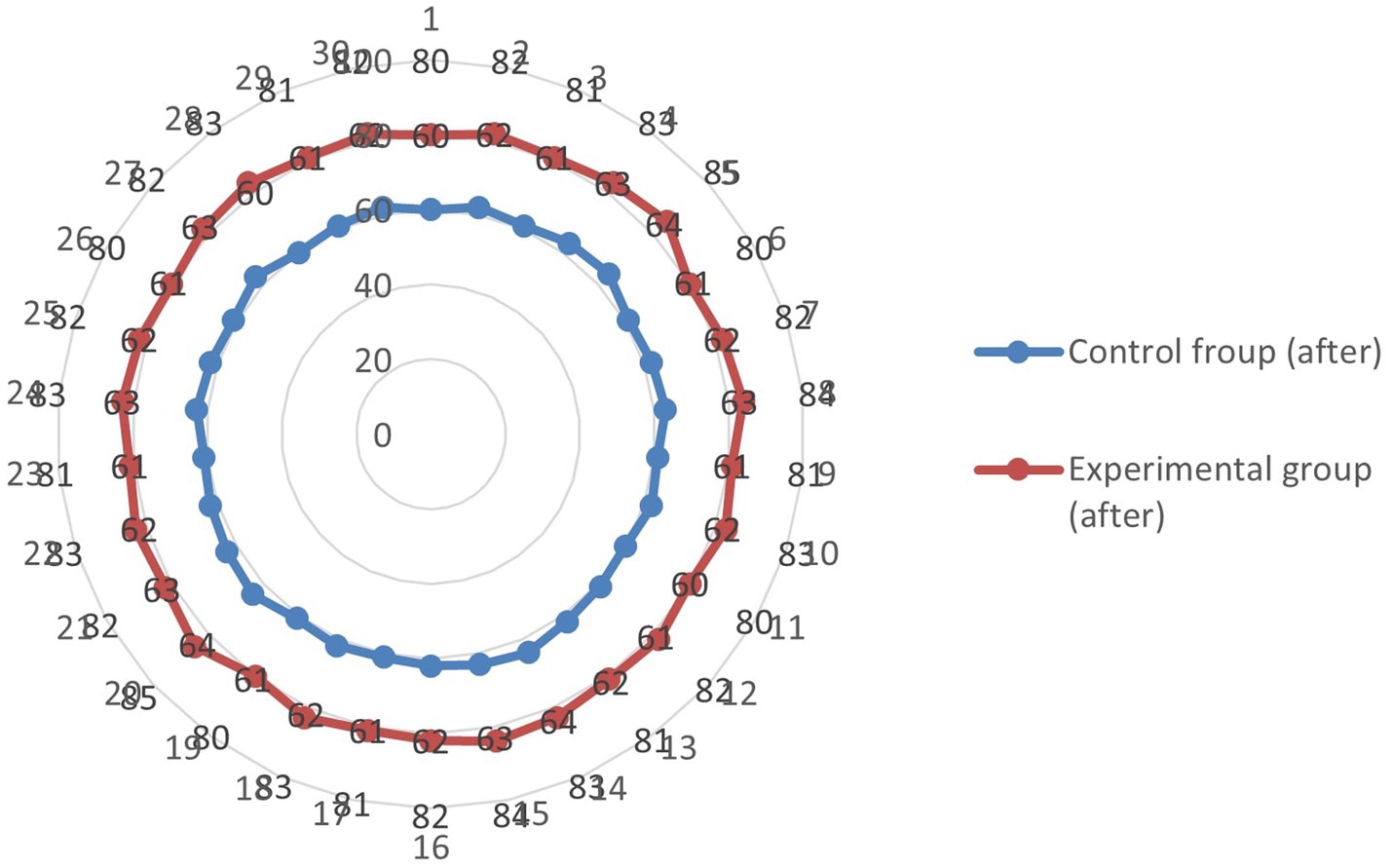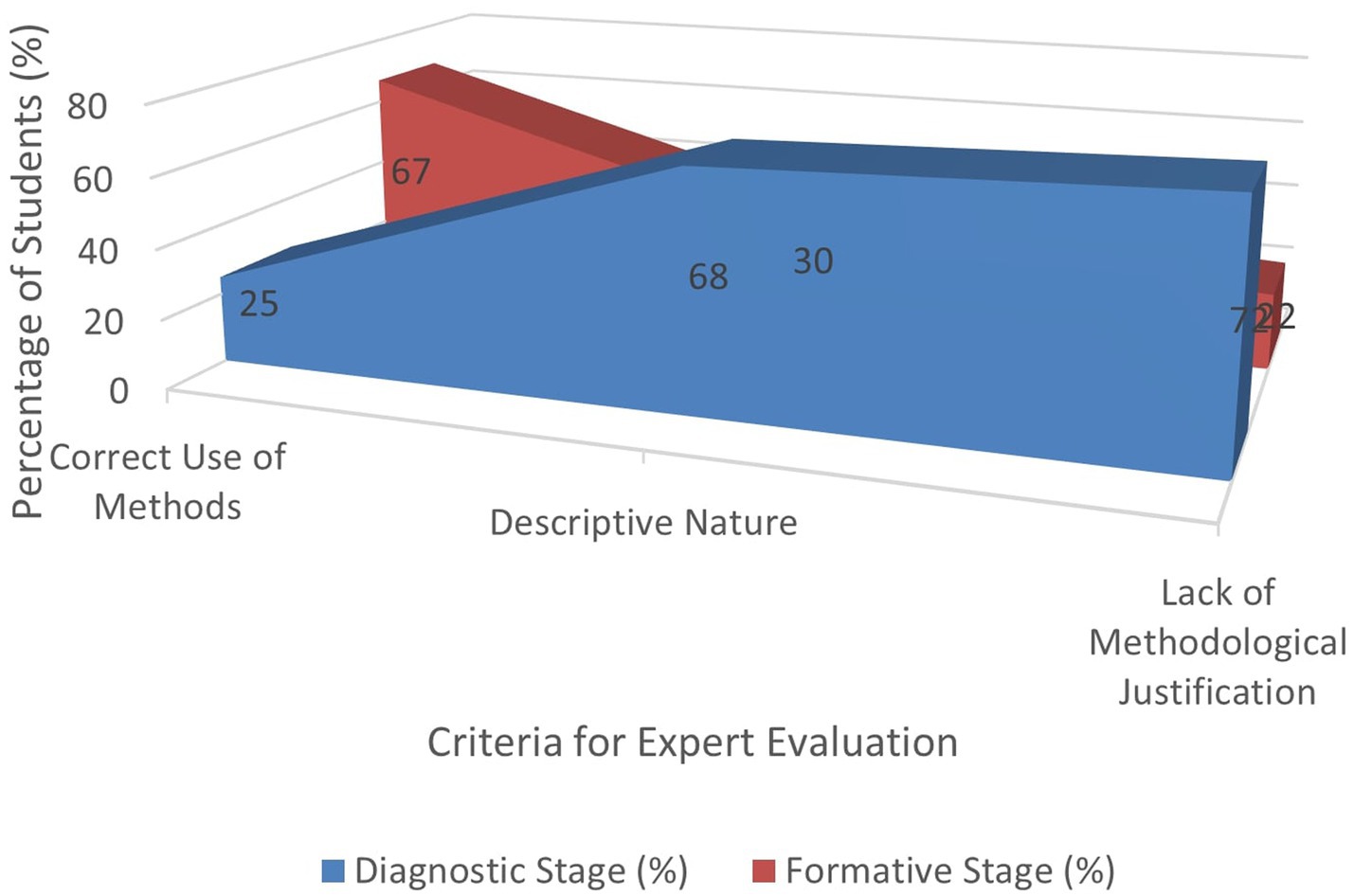- 1Kazakh National Pedagogical University named after Abai, Almaty, Kazakhstan
- 2Kazakh National Women’s Teacher Training University, Almaty, Kazakhstan
Introduction: Developing research competence is essential for future special education teachers to effectively analyze educational practices, conduct pedagogical research, and innovate teaching strategies for children with special educational needs. This study aimed to examine methods for enhancing research skills among students in special education programs at universities in Kazakhstan.
Methods: A quasi-experimental research was conducted at two Kazakh universities: Abai Kazakh National Pedagogical University (Almaty) and I. Zhansugurov Zhetysu University (Taldykorgan). The study involved 122 third-and fourth-year students specializing in special education, who were randomly divided into an experimental group (n = 62) and a control group (n = 60). The experimental group participated in an elective course titled “Research Competencies in Special Education” and activities organized by the “Young Scientists Club.” Data collection employed a combination of quantitative and qualitative methods, including pedagogical experiments, surveys, standardized tests, and expert assessments. Statistical analyses were conducted using SPSS software with Student’s t-test to assess differences between groups.
Results: The experimental group exhibited statistically significant improvements (p < 0.01) compared to the control group in their ability to identify research questions, select appropriate methodologies, analyze data, and apply scientific approaches to practical tasks. Post-intervention assessments indicated that research skills in the experimental group improved markedly (average scores increased from 57.41 to 82.37%). Additionally, students reported higher motivation and confidence in using research methods.
Discussion: The results confirm that integrating targeted educational interventions, combining theoretical coursework and practical research experiences, effectively enhances research competence in future special education teachers. The elective course and participation in the academic club created conditions conducive to active learning and independent research practice. These findings support broader adoption of structured research-based curricula within special education teacher training programs to cultivate critical thinking and evidence-based pedagogical skills.
1 Introduction
Currently, special education teacher training programs do not focus enough on research abilities, even though these skills are crucial for success in the field. Aspiring educators are expected not only to tailor teaching methods to meet students’ individual needs but also to develop new research-based strategies to improve the learning experience effectively. Research competence entails proficiency in scientific analysis methods, the ability to critically evaluate pedagogical practices, conduct empirical research, and implement innovative teaching strategies. In this regard, the issue of improving the training system for special education teachers becomes particularly relevant, emphasizing the need for effective methods to develop their research skills during higher education. The reform of teacher education in Central Asian countries has not established proper structures for research training for future teachers. The situation is most critical in special education because future specialists need to base their non-standard decisions on scientific research data rather than methodological templates. The absence of permanent systems to develop students’ research abilities restricts their career advancement and their ability to adapt to the fast-changing, inclusive educational environment. When research competence development receives insufficient attention, teachers develop a superficial professional understanding and weak evidence-based teaching skills, as well as poor abilities to analyze educational situations. The quality of the educational process and social integration of children with special needs will suffer because of such unpreparedness in an inclusive learning environment, which demands individualized approaches to each case. According to the definition of the Organization for Economic Cooperation and Development (OECD), research competence includes the ability to formulate problems, develop and test hypotheses, select and apply adequate analysis methods, and critically interpret data in the context of educational practice. In a broader sense, it encompasses both reflection skills and readiness for continuous professional development through research activities.
An analysis of scientific literature (Shulman, 1986; Cochran-Smith and Lytle, 2009; Zeichner, 2010; Ball et al., 2008) indicates that integrating a research culture into teacher education fosters the development of critical thinking, analytical skills, and the ability to independently study educational issues. Research confirms that teachers with well-developed research competence adapt more effectively to changes in the educational environment, apply innovative teaching methods, and demonstrate a high level of professional reflection. However, despite the importance of this aspect, it remains underdeveloped in the domestic system of special education teacher training. Most higher education programs primarily focus on transmitting subject knowledge while paying insufficient attention to equipping students with the methodological foundations of research. This creates a need for the implementation of new educational technologies and organizational models that promote the integration of research activities into professional training.
The object of the study was the educational process in higher education institutions aimed at developing research competence among students of special education. Based on the identified problem, the purpose of the study was to develop and test methods that contribute to the effective enhancement of research competence in future special education teachers within the framework of university education. To achieve this goal, the following tasks were formulated in the study:
1. To analyze theoretical approaches to the concept of research competence and identify its key components in the context of special education teacher training.
2. To develop and describe the structure of an educational model combining an elective course and a student science club aimed at developing students’ research skills.
3. To empirically verify the effectiveness of the proposed model by comparing the level of research competence of students in the experimental and control groups before and after the pedagogical intervention. In the framework of this study, the following question was posed: to what extent does the purposeful inclusion of research components in the educational process in the form of an elective course and a scientific student club contribute to the formation of research competence among future special education teachers?
Based on this objective, the research hypothesis was formulated as follows: the integration of specialized educational courses and scientific clubs into the training program for special education teachers contributes to the improvement of their research competence. This enhancement is reflected in the development of skills related to the analysis of pedagogical data, the ability to conduct independent research, and the design of innovative teaching methodologies.
1.1 Literature review
The formation of the research competence of future teachers is an important area in modern teacher education. Researchers have repeatedly emphasized that the ability to conduct scientific research, analyze pedagogical data, and develop innovative techniques plays a crucial role in the professional development of specialists. The concept of “knowledge for teaching,” proposed by Shulman (1986), has become one of the key theoretical foundations of teacher education. According to his model, a teacher’s professional knowledge includes not only knowledge of the subject matter, but also methods of teaching it, which creates the basis for the formation of research skills. This idea was developed in the works of Darling-Hammond (2000), where the author proves that the level of training of future teachers is directly related to their ability to perform analytical and reflective activities. In her research, Darling-Hammond develops the concept of teacher effectiveness, considering it as a multicomponent system that includes professional knowledge, pedagogical skills, research competence, and the ability to adapt to changing educational environments.
The research competence of future teachers cannot be developed without appropriate methodological approaches. Ball et al. (2008) argue that a teacher training program should include not only subject knowledge but also methodological foundations for conducting research in real-world educational settings. In their works, they develop the concept of Mathematical Knowledge for Teaching (MKT), which shows that effective teaching requires not only mastery of the discipline but also an understanding of how students master the content and what methods can contribute to this process.
Within the framework of this concept, Ball et al. identified several key components of pedagogical knowledge necessary for studying the educational process, as illustrated in Figure 1.
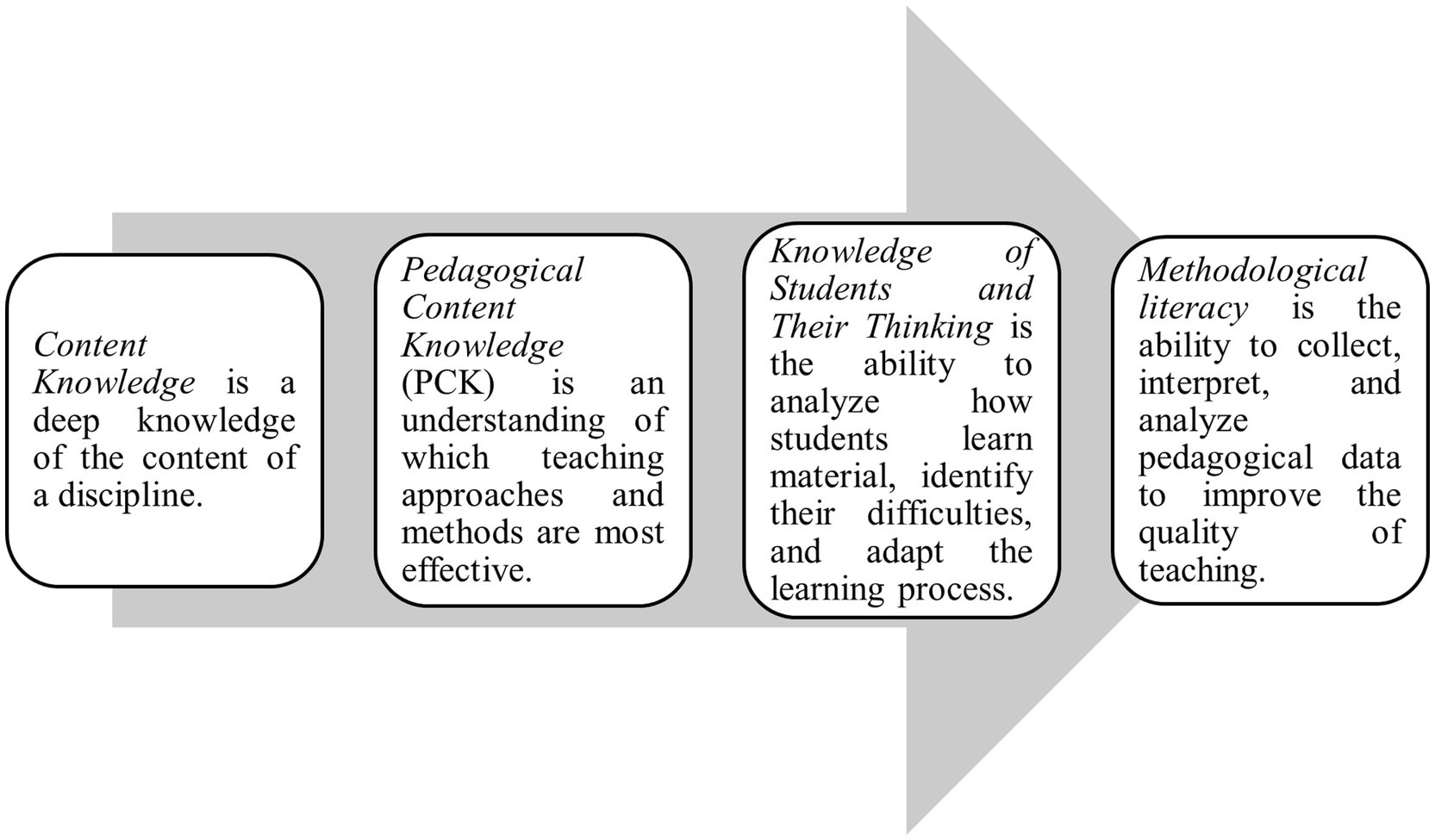
Figure 1. Components of teachers’ professional knowledge (adapted from Ball et al., 2008).
As evidenced by the research conducted by Alquraini and Rao (2018), it is imperative that future special education teachers receive inclusive training, which entails aspects of research to help students gain analytical and reflective skills. In her paper, Majoko (2019) discusses the importance of core competencies for inclusive education, and especially the role of research competencies in helping educators to critically examine and modify educational procedures. Montenegro-Rueda et al. (2022) underscores the importance of developing digital competencies for special education teachers, which increases their aptitude to research and apply the latest technology within educational practices. In their article, Koval et al. (2023) state that the development of research competence of future specialists is impossible without a constant connection between the theoretical and the practical parts of the training process, which contributes to the formation of analytical and reflective skills. Cook et al. (2020) provide solid evidence for claiming that research methods training is a necessary component of the professional preparation of special educators, and the quality of educational activities is directly related to it. Alsolami (2022) examined the effect of training in assistive technology on the research behavior of special education teachers and stressed the need for a systematic approach to professional development and ongoing competency enhancement. Ashimkhanova et al. (2024) offer a method for developing inclusive capabilities based on pedagogical principles, thereby encouraging future teachers to adopt a broader research perspective. In their article, Leko et al. (2015) argued that standardized training for special educators is essential for the development of a sustainable research stance and overall professional competence. Kepanen et al. (2020) examine learning processes in a competence-based approach, which explains the details of the educational pathways for the future special educators and their effects on the formation of research competency. Toquero (2021) highlights action research as one of the most effective ways of encouraging research competencies among future teachers.
In the article by Amirova et al. (2020), the role of creative and research competencies in the professional training of educators is explored, and it is highlighted that active learning is a successful teaching strategy. Current research on preparing future teachers to work with students with special educational needs increasingly addresses the development of their research and analytical skills. Aleshina et al. (2022) demonstrate that fostering research competence within the framework of the IDEA requires combining a deep understanding of subject content with the ability to apply methods of data collection and interpretation. Rumrill et al. (2020), in turn, examine practices for supporting students with disabilities in higher education, emphasizing the importance of adapted academic strategies and promoting social inclusion. These perspectives highlight that effective teacher preparation is inseparable from the integration of methodological training and inclusive pedagogy. Ketrish et al. (2016) focus on the need for project competence for future special education teachers in the context of inclusive education. Fernandes et al. (2021) explain the formation of soft skills in special educators and their relevance for the implementation of the research practice. Mkrttchian and Belyanina (2018) stress the role of context and project activities in the effective acquisition of research competencies by students in special education. Anisimova and Sabirova (2020) show that integration of STEAM (Science, Technology, Engineering, Arts, and Mathematics) education has a positive impact on the project and research competencies of teachers. Dobosh et al. (2022) focus on innovative technologies as a critical factor that can improve the quality of the professional preparation of the future special educators and, therefore, the formation of the research competencies. Yerzhanova (2024) notes the need for refining the content and methods of the research competency training for special educators and also stresses the need for individualization of the education process and the practical orientation of the training.
Thus, the analysis of scientific literature indicates that the development of the research competence of future special educators is a complex and multifaceted process. The inclusion of research methods in educational programs contributes to the formation of critical thinking, an innovative approach to solving professional problems, and the ability to self-develop. Modern technologies, participation in professional communities, and integration of interdisciplinary knowledge are key elements of this process. In the future, further research should be aimed at developing specific mechanisms and methods for introducing research activities into teacher training programs, which will improve the quality of teacher education and the level of professional competence of future specialists.
2 Methodology and materials
2.1 Research design
The study employed a quasi-experimental design involving a control and an experimental group to assess the effectiveness of methods for developing research competence in future special education teachers. The research was conducted in real educational settings, ensuring its practical relevance and the potential for integrating the obtained results into teacher training programs.
The primary approach used was pedagogical intervention, which included the implementation of the elective course “Research Competencies in Special Education” and the organization of student research activities through participation in the Young Scientists Club.
The research process comprised three key stages: diagnostic, formative, and control. During the diagnostic stage, an initial assessment was conducted to determine students’ baseline level of research competence. The formative stage involved the introduction of specialized educational programs in the experimental group. Finally, in the control stage, follow-up testing and expert evaluation were carried out to identify changes resulting from the pedagogical intervention. This research design was implemented across two higher education institutions with comparable special education programs, as detailed in the following section.
2.2 Sampling and research procedure
The study was conducted at two higher education institutions in Kazakhstan: Abai Kazakh National Pedagogical University (Almaty) and I. Zhansugurov Zhetysu University (Taldykorgan). A total of 122 third-and fourth-year students specializing in Special Education participated in the study. To ensure the reliability and representativeness of the sample, students were randomly assigned to the control group (n = 60) and the experimental group (n = 62). The demographic characteristics of participants in both control and experimental groups were similar. Students in the study had an average age of 20.5 years (SD = 1.1), which aligns with the common age range for special education bachelor’s degree students in Kazakhstan during their third and fourth years. The participants consisted of 81% women and 19% men, which matches the typical gender distribution of students in this field. The students maintained an average academic grade point average (GPA) of 3.28 out of 4.0. The initial diagnosis results showed no statistically significant differences between groups regarding basic academic and demographic variables (p > 0.05), which confirmed the initial equivalence of the sample.
The distribution of students into groups was carried out using a stratified random sampling method, taking into account the university and the course of study, which made it possible to ensure a balanced sample of key parameters. The control group studied according to the standard educational program, which includes compulsory subjects in special education, pedagogy, and psychology, as well as general professional courses. The students in this group performed traditional academic tasks—written articles, participation in seminars, and passing the current control. However, their academic workload did not include specially organized activities aimed at developing research competence, such as elective subjects on research methodology or participation in scientific clubs. In contrast, the experimental group received additional educational components designed to foster research skills, including the elective course “Research Competencies in Special Education” and participation in the Young Scientists Club. The study lasted for one academic year (September 2023 to May 2024). During this period, students in the experimental group were systematically engaged in research activities through the development of scientific projects, participation in academic conferences, and the completion of practical assignments related to the analysis of pedagogical data.
The study was approved by the Ethics Committee of the participating universities (protocol number 2 dated 25 September 2024), which confirms compliance with ethical standards when working with participants.
2.3 Data collection
For a comprehensive assessment of the level of formation of the research competence of future special education teachers, both quantitative and qualitative methods of data collection were used in the study. At the diagnostic stage, students were interviewed and tested in order to identify the initial level of knowledge in the field of scientific research methodology, the ability to analyze pedagogical data, as well as motivation for scientific activity. The questionnaire included both closed and open-ended questions aimed at identifying students’ attitudes to research, their level of confidence in their own analytical skills, and their experience of participating in research projects. The test consisted of tasks assessing the understanding of basic concepts of scientific research, data interpretation skills, and the ability to formulate hypotheses. The reliability of the test was confirmed by calculating Cronbach’s coefficient (α = 0.81), which indicates a high internal consistency of the instrument. The questionnaire was tested earlier on a similar sample of students and showed stable indicators of validity. At the formative stage, the assessment of students’ involvement in scientific activities was carried out based on the analysis of scientific projects carried out by them within the framework of the Young Researcher club and the elective course. Such parameters as the depth of study of the research problem, the correctness of the application of analysis methods, the design of the results, and the level of independence were taken into account. In addition, students kept individual research diaries (journals), which reflected the process of working on projects, difficulties encountered, as well as the development of their professional and research skills. At the final (control) stage, data collection included repeated testing and questionnaires, as well as an expert assessment of students’ final work. To increase objectivity, teachers who were not involved in the implementation of the elective course were involved, and the assessment was carried out according to pre-approved criteria and using standardized headings.
The data obtained made it possible to compare the level of students’ research competence before and after the pedagogical intervention, as well as to conduct a comparative analysis between the control and experimental groups.
2.4 Data analysis
The analysis of the collected data was carried out using both quantitative and qualitative methods. The quantitative data obtained during the input and final testing were processed using the SPSS statistical package. The Student’s t-test was used to assess the differences between the control and experimental groups. The analysis focused on changes in the level of research competence formation, reflected in the scores of tests and questionnaires, as well as in the dynamics of students’ research skills during the academic year.
The qualitative analysis included an expert assessment of students’ individual research projects, an analysis of the contents of their reflective rubrics (Table 1), as well as semi-structured interviews with teachers in charge of academic and scientific activities. The student’s papers were evaluated by independent experts who were not involved in the implementation of the educational intervention. To minimize subjectivity, standardized evaluation headings were used, covering the criteria of scientific validity, correctness of the application of analytical methods, logical reasoning, and originality of approach.
The combined use of quantitative and qualitative analysis allowed not only to record statistically significant changes but also to identify the characteristic features of the formation of research competence in a pedagogical experiment. The results obtained became the basis for discussing the effectiveness of the proposed model of training future special education teachers.
3 Results
During the phase of the research project, questionnaires and assessments were carried out with students to evaluate their research skills at the outset and pinpoint any obstacles they faced in understanding research methods. The survey’s goal was to investigate how students feel about engaging in research activities and their motivation levels based on their past involvement in scientific research work. They also underwent assessments to gauge their understanding of research techniques, proficiency in data analysis, and capacity to implement methods in settings.
Table 2 demonstrates the survey included 10 questions divided into four areas: motivation and outlook, on research work experience with sources, confidence in applying research techniques, and expectations from training in this field analysis of the survey findings showed that 73% of students showed interest in scientific research activities; however, only 28% felt secure in utilizing basic pedagogical research methods; moreover s over 68% of participants highlighted challenges with data interpretation and writing scientific papers indicating a lack of adequate training, in research tasks.
The examination aimed to evaluate students’ understanding of research techniques and their capability in interpreting data, along with their competency in developing hypotheses. A set of 20 inquiries was administered, covering four areas, including the groundwork of educational research strategies for gathering and analyzing data, handling scientific references, and drawing conclusions. The mean score among participants in the control group was 58.3%, while among those in the experimental group, it was 57.8%, displaying no variations between the two groups (p > 0.05). The findings suggest that initially, both sets of students had levels of research training but lacked a grasp of research methodology overall, which emphasizes the necessity for more enhancements in this domain.
Table 3 presents the specific questions used in the “Students’ Research Training” test, highlighting key research competencies assessed during the evaluation.
Additionally, an analysis of students’ academic papers, including coursework and research essays, was conducted to assess their ability to independently formulate research problems, correctly select methodologies, and critically analyze data (Figures 2, 3). An expert evaluation of 60 randomly selected papers revealed that only 25% of students correctly applied research methods, whereas 68% of the papers were purely descriptive, and 72% of students failed to justify their choice of methodological approaches. The key identified issues included weak hypothesis formulation, difficulties in data interpretation, and a lack of a systematic approach to literature analysis.
Thus, the diagnostic stage of the study, which is illustrated in Figure 4, allowed for the assessment of students’ initial level of research competence and the identification of key gaps in their training. The obtained results confirmed the need for the purposeful integration of specialized courses into the educational process, aimed at developing research skills and enhancing practice-oriented research activities in the training of special education teachers. Based on the identified issues, educational strategies were developed and implemented in the experimental group, including the elective course “Research Competencies in Special Education” and students’ participation in the Young Scientists Club. These measures were designed to address the identified challenges and improve students’ research competence, which became the main focus of the subsequent formative stage of the study.
In the experimental group, the formative stage included two key educational strategies: the elective course “Research Competencies in Special Education” and participation in the Young Scientists Club.
The elective course consisted of 10 modules covering essential aspects of scientific research, including:
1. Fundamentals of pedagogical methodology
2. Methods of data collection and analysis (both qualitative and quantitative)
3. Interpretation of research results
4. Preparation of scientific publications
5. Bibliographic formatting and citation
6. Use of digital tools for data analysis
Table 4 outlines the modules included in the elective course “Research Competencies in Special Education,” highlighting the main educational components designed to enhance students’ research skills.
Students not only studied theoretical concepts but also conducted their own mini-research projects. For instance, one hands-on assignment in the course required carrying out a survey among educators at education schools and interpreting the gathered information using techniques. Moreover, a Young Scientists Club was set up to allow students to delve deeper into research endeavors. As part of the club activities, students worked on research projects, took part in symposiums, and examined recent studies in the special education domain. During their meetings and at the club’s sessions, one topic they delved into was “Utilizing Digital Tools for Teaching Special Needs Children.” In this initiative, tasks involved gathering data and examining studies, along with hands-on testing of learning resources. (Table 5).
The chart outlines an overview of the activities planned for the educational approaches initiated in the initial phase of the research project—specifically focusing on the elective class “Research Skills, in Special Education” and the Young Scientists Club initiative. Within the elective course activity agenda stands an assignment tailored to enhance students’ abilities in crafting data-gathering instruments and interpreting findings effectively. Throughout this task, within the elective course structure itself, students are tasked with defining a research dilemma, developing a survey aimed at educators within specialized education institutions, administering the survey, and scrutinizing the gathered data. This assignment not only improves students’ proficiency in research methods but also nurtures their critical analysis skills and ability to organize information systematically. The next activity in the Young Scientists Club focuses on applying knowledge in real-world scenarios by carrying out a research project that involves reviewing scientific papers and interviewing educators to compile methodological suggestions based on the gathered data. This project fosters the growth of research and analytical capabilities while also teaching students how to apply discoveries within educational settings.
Each assignment involves defined phases of execution to promote the advancement of research abilities in students. The assessment standards utilized enable an assessment of the quality of task execution, ensuring that the efficiency of these assignments is evident and replicable. Therefore, these assignments do not enhance vocational competencies but also immerse students in genuine research practices, equipping aspiring special education educators for critical and inventive engagements within their chosen profession (Table 6).
The initial findings showed an enhancement in research skills among the participants in the group.
The data from Figure 5 demonstrates student interest in research activities throughout the course duration. The initial research interest of 73% of participants grew to 78% after they finished the elective course and joined the Young Researcher Club. The students’ confidence in using research methods showed substantial growth from 28% at the start to 71% at the end of the study. The percentage of students who faced challenges with data analysis and scientific paper writing decreased from 68 to 32%. The indicators show positive development of research skills and attitudes because of the implemented pedagogical intervention.
The examination of the outcomes demonstrated in Figure 6, from both the control and experimental groups, shows variations in how they approach their research education following the formative period.
During the assessment phase of the study conducted on students’ research competence levels in two groups – control and experimental – it was found that both groups had average test scores at around 58 59%. Following their involvement in the course and the Young Scientists Club activities afterward, the experimental group displayed an enhancement in their scores, averaging 82% while the control group’s scores only saw a slight rise, to about 63%. Implementing techniques significantly enhances students’ research skills compared to traditional learning methods that do not show similar advancements in progress.
To test the effectiveness of pedagogical intervention, a statistical analysis was performed using the Student’s t-test for independent samples. In the control group (n = 38), the average score on the final test was 63.2 with a standard deviation of 5.74. At the same time, the students of the experimental group (n = 43) who completed the course with the included research components showed significantly higher results, with an average score of 82.5 and a standard deviation of 6.02. The calculations showed a statistically significant difference between the groups: t(79) = 14.45, p < 0.0001.
The data obtained indicate that the inclusion of research practices in the educational program through an elective course and participation in a student scientific club has a significant impact on the formation of research competence in future special education teachers. These conclusions are confirmed both in the test results and in the qualitative assessment by experts and student questionnaires (see Figures 6, 7). These conclusions are supported by feedback collected through surveys. Testing at points during the study revealed that incorporating research skills into the curriculum via optional classes and academic clubs proves to be a valuable method in equipping aspiring professionals in special education for their future roles.
The analysis shown in Figure 8 shows an improvement in the quality of students’ research assignments after the formative stage. At the diagnostic stage, only 25% of the participants demonstrated a confident command of research methods, while the majority (68%) used a predominantly descriptive approach without in-depth application of scientific methods. In addition, 72% of students had difficulty justifying the choice of research strategies, which indicated a lack of preparation for research tasks.
After completing the elective course “Research Skills in Special Education” and participating in the Young Researcher Club, the proportion of students successfully applying research methods increased to 67%. At the same time, the number of descriptive papers decreased to 30%, and the proportion of projects without methodological justification decreased to 22%. These data indicate a significant increase in students’ research competence as a result of pedagogical intervention.
The findings of this study demonstrate that implementing a specialized academic course combined with student research club activities significantly enhances students’ research competencies. A comparative analysis of the results obtained by control and experimental groups during the formative stage strongly supports this hypothesis (see Figure 7).
After processing and analyzing the collected data, a notable difference emerged between the final scores of the control and experimental groups. The average final test score in the control group was 61.03%, while the experimental group achieved a significantly higher average of 84.7%. Additionally, the variance within each group was relatively low, with a standard deviation being 1.16 in the control group and 2.89 in the experimental group. This indicates that improvements in research skills in the experimental group were consistent and systematic rather than attributed solely to individual student achievements. To confirm the statistical significance of the differences identified, an independent samples Student’s t-test was performed. The calculated t-value was −41.62 with a significance level of p < 0.001, clearly indicating a statistically significant advantage for the experimental group over the control group. Therefore, it can be confidently concluded that the improvement observed in the experimental group was not accidental. Moreover, the data distribution was checked for normality using the Shapiro–Wilk test. The control group yielded a p-value of 0.00018, suggesting a significant deviation from normal distribution, whereas the experimental group demonstrated a normal distribution with a p-value of 0.305. Despite the deviation from normality in the control group, the sizes of both groups were sufficiently large to justify the use of parametric statistical methods, which were applied in this study.
4 Discussion
The purpose of this study was to develop and test methods that promote the development of research competence in future special education teachers. The results clearly demonstrate that the integration of a specialized elective course and the active participation of students in a scientific club significantly increase the level of research skills and motivation for scientific activity. The research objectives, including the analysis of theoretical approaches to research competence, the creation of a learning model, and its empirical verification, were successfully completed. In particular, the experimental group showed significant improvements compared to the control group in both the test results and the expert assessment of the work performed. The hypothesis that incorporating research components into the educational process contributes to the development of students’ skills in analyzing pedagogical data, conducting independent research, and designing innovative methods has been convincingly confirmed. This is reflected in an increase in the level of theoretical training and practical competence of the participants in the experiment. The research question about the extent to which the purposeful inclusion of research elements through an elective course and a student science club contributes to the formation of research competence also received a positive answer. The results demonstrate that such integration is an effective strategy to improve the quality of training for future specialists. Such conclusions are consistent with the position of Darling-Hammond (2000), who emphasizes that the inclusion of research elements into the educational training of future teachers develops their analytical thinking and reflexivity. Ball et al. (2008) emphasize that the successful development of research competence is possible only if methodological foundations are combined with meaningful training. Our data are also consistent with the results of Toquero (2021), where it is noted that the use of the action research methodology contributes to the deeper development of research skills among students of pedagogical fields. Furthermore, the results of the study have the potential to be applied in a broader international context. Despite the fact that the experiment was conducted in the conditions of Kazakhstani universities, the concept of integrating elective courses and scientific clubs for developing research competence can be adapted to the educational systems of other countries. This model helps future teachers develop not only theoretical knowledge but also practical skills necessary for successful work in an inclusive education environment and constant changes in teaching practice.
The analysis of foreign studies shows that the active involvement of students in research activities through specially organized programs is a universal mechanism for improving the quality of teaching staff training. Thus, the proposed model can become the basis for the creation of effective methods in the training of special education teachers in various educational systems, considering their cultural and institutional characteristics.
5 Limitations
The study produced positive findings, but researchers need to acknowledge several constraints in this research. The experiment took place at two universities in Kazakhstan, which restricts the ability to apply the results to educational institutions with unique conditions and programs. The study lacked a mechanism to track research competency stability over time, which makes it challenging to evaluate how the duration of pedagogical intervention affects students. Future research should focus on increasing sample size by including universities with diverse educational profiles while performing longitudinal studies to evaluate the extended impact of integrated learning models on special education teacher professional development.
6 Conclusion
The study findings confirm that integrating the elective course with science club activities helps future special education teachers develop their research competencies. The experimental group showed significant advancement in both theoretical knowledge and practical research competencies, as well as critical thinking abilities. The findings indicate that educational research components help students become more independent and motivated, which serves as a vital base for teacher training in modern educational environments.
Future research needs to explore this model’s implementation across multiple educational systems while performing prolonged assessments of its effectiveness. The Study on how research competence impacts the professional success of graduates continues to be an essential area for investigation.
Data availability statement
The raw data supporting the conclusions of this article will be made available by the authors, without undue reservation.
Ethics statement
The studies involving humans were approved by Ethics committee of Abai Kazakh National Pedagogical University. The studies were conducted in accordance with the local legislation and institutional requirements. The participants provided their written informed consent to participate in this study.
Author contributions
GY: Conceptualization, Validation, Writing – original draft, Writing – review & editing. AA: Data curation, Investigation, Methodology, Writing – original draft, Writing – review & editing. BM: Formal analysis, Resources, Writing – original draft, Writing – review & editing. MI: Funding acquisition, Supervision, Writing – original draft, Writing – review & editing. SN: Conceptualization, Data curation, Writing – original draft, Writing – review & editing.
Funding
The author(s) declare that no financial support was received for the research and/or publication of this article.
Conflict of interest
The authors declare that the research was conducted in the absence of any commercial or financial relationships that could be construed as a potential conflict of interest.
Generative AI statement
The authors declare that no Gen AI was used in the creation of this manuscript.
Any alternative text (alt text) provided alongside figures in this article has been generated by Frontiers with the support of artificial intelligence and reasonable efforts have been made to ensure accuracy, including review by the authors wherever possible. If you identify any issues, please contact us.
Publisher’s note
All claims expressed in this article are solely those of the authors and do not necessarily represent those of their affiliated organizations, or those of the publisher, the editors and the reviewers. Any product that may be evaluated in this article, or claim that may be made by its manufacturer, is not guaranteed or endorsed by the publisher.
References
Aleshina, E. Y., Lubov, B., Tankov, N., Mkrttchian, V., and Belyanina, L. (2022). “Research competence for teaching students with disabilities act (IDEA) in Russian general education” in Research anthology on physical and intellectual disabilities in an inclusive society (IGI Global), 264–276.
Alquraini, T. A. S., and Rao, S. M. (2018). A study examining the extent of including competencies of inclusive education in the preparation of special education teachers in Saudi universities. Int. J. Disabil. Dev. Educ. 65, 108–122. doi: 10.1080/1034912X.2017.1327651
Alsolami, A. S. (2022). Teachers of special education and assistive technology: teachers’ perceptions of knowledge, competencies and professional development. SAGE Open 12, 1–12. doi: 10.1177/21582440221079900
Amirova, A., Iskakovna, J. M., Zakaryanovna, T. G., Nurmakhanovna, Z. T., and Elmira, U. (2020). Creative and research competence as a factor of professional training of future teachers: perspective of learning technology. World J. Educ. Technol. 12, 278–289. doi: 10.18844/wjet.v12i4.5181
Anisimova, T., and Sabirova, F. (2020). Formation of design and research competencies in future teachers in the framework of STEAM education. Int. J. Emerg. Technol. Learn. 15, 204–217. doi: 10.3991/ijet.v15i02.11537
Ashimkhanova, G., Autayeva, A., and Nurgaliyeva, A. (2024). Pedagogical principles formation of inclusive competence of future special teachers. Higher School Kazakhstan 48, 33–43. doi: 10.59787/2413-5488-2024-48-4-34-43
Ball, D. L., Thames, M. H., and Phelps, G. (2008). Content knowledge for teaching: what makes it special? J. Teach. Educ. 59, 389–407. doi: 10.1177/0022487108324554
Cochran-Smith, M., and Lytle, S. L. (2009). Inquiry as stance: Practitioner research for the next generation. New York: Teachers College Press.
Cook, A., Ogden, J., and Winstone, N. (2020). The effect of school exposure and personal contact on attitudes towards bullying and autism in schools: A cohort study with a control group. Autism, 24, 2218–2232. doi: 10.1177/1362361320937088
Darling-Hammond, L. (2000). Teacher quality and student achievement: a review of state policy evidence. Educ. Policy Analysis Archives 8, 1–44. doi: 10.14507/epaa.v8n1.2000
Dobosh, O., Koval, D., Cherednichenko, N., Bondar, I., Petrenko, Y., Melnyk, S., et al. (2022). Formation of research competence using innovative technologies to improve the quality of training future specialists. Mukachevo State University Repository. 22, 91–98. doi: 10.22937/IJCSNS.2022.22.12.12
Fernandes, P. R. S., Jardim, J., and Lopes, M. C. S. (2021). The soft skills of special education teachers: evidence from the literature. Education Sciences 11:125. doi: 10.3390/educsci11030125
Kepanen, P., Määttä, K., and Uusiautti, S. (2020). How do students describe their study processes in the competence-based vocational special education teacher training? Hum. Arenas 3, 247–263. doi: 10.1007/s42087-019-00080-y
Ketrish, E. V., Dorozhkin, E. M., Tretyakova, N. V., Andryukhina, T. V., and Mantulenko, V. V. (2016). Building of projecting competence among future teachers in the conditions of introduction of inclusive education. Int. J. Environ. Sci. Educ. 11, 8237–8251.
Koval, V., Kushnir, A., and Vorona, V. (2023). Formation of future specialists’ research competence in the process of professional training. Revista Amazonia Investiga 12, 317–329. doi: 10.34069/AI/2023.61.01.32
Leko, M. M., Brownell, M. T., and Sindelar, P. T. (2015). Envisioning the future of special education personnel preparation in a standards-based era. Except. Child. 82, 25–43. doi: 10.1177/0014402915598782
Majoko, T. (2019). Teacher key competencies for inclusive education: tapping pragmatic realities of Zimbabwean special needs education teachers. SAGE Open 9, 1–14. doi: 10.1177/2158244018823455
Mkrttchian, V., and Belyanina, L. (Eds.). (2018). Handbook of research on students\u0027 research competence in modern educational contexts. IGI Global. doi: 10.4018/978-1-5225-3485-3
Montenegro-Rueda, M., López-Meneses, E., and Fernández-Cerero, J. (2022). Digital competence of special education teachers: impact, challenges and opportunities. Austral. J. Special Inclusive Educ. 46, 47–60. doi: 10.1017/jsi.2022.1
Rumrill, P. D., Cook, B. G., and Stevenson, N. A. (2020). Research in special education: Designs, methods, and applications. 3rd Edn. Springfield, IL: Charles C Thomas Publisher.
Shulman, L. S. (1986). Those who understand: knowledge growth in teaching. Educ. Res. 15, 4–14. doi: 10.3102/0013189X015002004
Toquero, C. M. D. (2021). “Real-world:” preservice teachers’ research competence and research difficulties in action research. J. Appl. Res. Higher Educ. 13, 126–148. doi: 10.1108/jarhe-03-2019-0060
Yerzhanova, G. (2024). The problem of developing the research competence of special educators. J. Spec. Educ. 1, 16–22. doi: 10.24234/se.v8i2.25
Keywords: research competence, special education teachers, pedagogical research, professional development, higher education, elective course, Kazakhstan
Citation: Yerzhanova G, Autayeva A, Mazhinov B, Iralina M and Nishanbayeva S (2025) Features of the development of research competence in future special education teachers. Front. Educ. 10:1610757. doi: 10.3389/feduc.2025.1610757
Edited by:
Geoff Lindsay, University of Warwick, United KingdomReviewed by:
Edson Jorge Huaire-Inacio, Editor Revista Iberoamericana ConCiencia, PeruSunaryo Romli, Indonesia University of Education, Indonesia
Copyright © 2025 Yerzhanova, Autayeva, Mazhinov, Iralina and Nishanbayeva. This is an open-access article distributed under the terms of the Creative Commons Attribution License (CC BY). The use, distribution or reproduction in other forums is permitted, provided the original author(s) and the copyright owner(s) are credited and that the original publication in this journal is cited, in accordance with accepted academic practice. No use, distribution or reproduction is permitted which does not comply with these terms.
*Correspondence: Sabira Nishanbayeva, c2FiaXJhXzAxXzAzQG1haWwucnU=
†ORCID: Gulnur Yerzhanova, orcid.org/0000-0001-6150-5297
Akbota Autayeva, orcid.org/0000-0003-2270-3148
Bagdat Mazhinov, orcid.org/0000-0003-1097-5138
Mira Iralina, orcid.org/0000-0001-8757-0839
Sabira Nishanbayeva, orcid.org/0000-0002-4290-7511
 Gulnur Yerzhanova1†
Gulnur Yerzhanova1† Sabira Nishanbayeva
Sabira Nishanbayeva